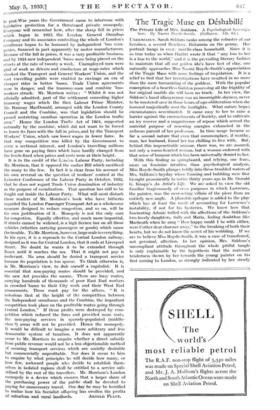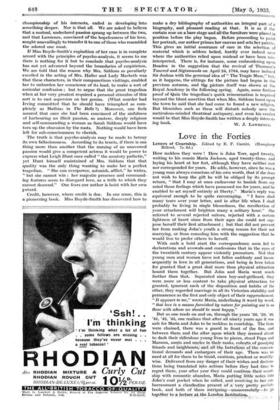The Tragic Muse en Deshabille
The Private Life of Mrs. Siddons. A Psychological Investiga. tion. By Naomi Royde-Smith. (Gollancz. 12s. ) UNDENIABLY, Sarah Siddons ranks among the robuster of our herbines, a second Boadicea, Britannia on the penny. Her portrait-hangs in ever; middle-class household. Since it is as true today as when Hazlitt wrote it that " any loss to her is a loss to the world," and it is the prevailing literary fashion to maintain that all our golden ido's have feet of clay, one naturally approaches Miss Naomi Royde-Smith's appreciation of the Tragic Muse with sonic feelings of trepidation. It is a relief to find that her investigations have resulted in no more than the mere humanizing of the goddess. With the popular conception of a heartless Galatea possessing all the frigidity of her original marble she will have no truck. In her view, the Siddons's basal idiosyncrasy was an incorrigible shyness, never to be mastered save in those hours of ego-obliteration when she towered majestically over the footlights. What nature began circumstances accentuated; It came easy to her to raise a barrier against the encroachments of Society, and to cultivate an icy reserve and a magnificence of repose which served the material purpose of renewing energies exhausted in the arduous pursuit of her profession. In time usage became so fdr a •seeond nature that even that commonplace, if .worthy, man, her husband; found her too chilling to live with. But, behind this impenetrable armour, there was, we are assured, not only a warm-hearted woman, but a woman endowed with that sense of humour which has been universally denied to her.
With this finding as springboard, and relying, one fears, more on 'feminine intuition than psychological analysis, Miss Roy do-Smith plunges boldly into those troubled waters of Mrs. Siddems's heyday whose foaming and bubbling were lira brotight prominently to notice thirty years ago in Mr. Oswald GACnapp's An Artist's Life.. we are asked to view the old familiar tragi-comedy of crass purposes in which Lawrence, the painter, was the over-acting villain of the piece from an entirely new angle. A- plausible epilogue is added to the play which has at least the merit of accounting for Lawrence's instability, if not for his hysterics. We know how that fascinating Adonis trifled with the affections of-the Siddons's two lovely daughters, Sally and Maria, feeling doubtless like Macheath when he sang " How happy could I be with either, were t'other dear charmer away," to the breaking of both their hearts, but we do not know the secret of his wobbling. If we are to believe Miss Royde-Smith, it was a case of transferred, not germinal, affection. In her opinion, Mrs. Siddons's uneompliant attitude throughout the whole pitiful tangle is only explainable by the hypothesis that the maternal tenderness shown by her towards the young painter on his first coming to London, so strongly indicated by her steady
championship of his -interests, ended in developing into something deeper. Nor is that all. We are asked to believe that a mutual, undeclared passion sprang up between the two and that Lawrence, convinced of the hopelessness of his love, sought unavailingly to transfer it to one of those who resembled the adored one most. .
If Miss Royde-Smith's expbsition of her case is in complete accord with the principles of psycho-analysis, it seems to me there is nothing for it but to conclude that psycho-analysis has not yet advanced beyond the boundaries of empiricism.. We are told that the reason why Mrs. Siddons so peculiarly excelled in the acting of Mrs. Haller and Lady Macbeth was that these characters, in their compunctious visitings, enabled her to unburden her conscience of its load, to make a sort of auricular confession ; but to argue that the great tragedian when at her very greatest required a personal stimulus of this sort is to cast aspersion on her genius. (What murder had Irving committed that he should have triumphed so com- pletely as Mathias in The Bells?) Moreover, one feels assured that once she had been convinced of the sinfulness of harbouring an illicit passion, so austere, deeply religious :and self-commanding a woman as Sarah Siddons would have torn up the obsession by the roots. Nothing would have been left for sub-consciousness to cherish.
The truth is that psycho-analysis may be made to betray its own fallaciousness. According to its tenets, if there is one thing more than another that the nursing of an unavowed passion would give a competent actress it would be power to express what Leigh Hunt once called " the amatory pathetic," yet Hunt himself maintained of Mrs. Siddons that that quality was the only thing wanting to make her a perfect tragedian. " She can overpower, astonish, afflict," he writes, " but she cannot win : her majestic presence and command- ing features seem to disregard love, as a trifle to which they cannot descend." One fears our author is hoist with her own petard.
Credit, however, where credit is due. In one sense, this is apioneering book. Miss Royde-Smith has discovered how to
make a dry bibliography of authorities an integral part of a biography, and pleasant reading at that.. It is as if the curtain rose on a bare stage and all the furniture were placed in position before the play began. Before proceeding to paint her portrait, our author primes her canvas and sets her palette. This gives an initial assurance of care in the selection of material which is seldom belied, hardly ever indeed save where the authorities relied upon mislead or have been mis- interpreted. There is, for instance, some embroidering upon Boaden in the suggestion that the revival of Thomson's Tancred and Sigismunda on April 24, 1784, may have imbued Sir Joshua with the germinal idea of " The Tragic Muse," but, as it happens, the sittings for the picture had begun in the previous autumn, and Ake picture itself was shown at the Royal Academy in the following spring. Again, some further proof of Quin the tragedian's quick reincarnation is required beyond the blunt assertion that when Mrs. Siddons burst upon the town he said that she had come to found a new religion. But blemishes such as these will disturb nobody save the meticulous-minded theatrical antiquary, and even • his verdict would be that Miss Royde-Smith has written a deeply interest-











































 Previous page
Previous page